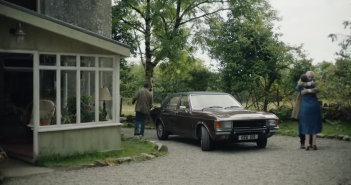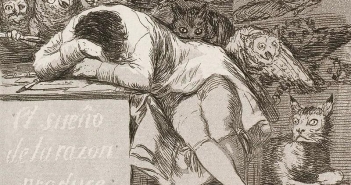Pint-sized, the pub was a little too far off from Glendalough for foreigners to find.
It hadn’t been designed for domesticated dads on the quest to Clara Lara Fun Park, but the Maze in Greenan grew close enough to spew a few tourists and persistent purists seeking a pew, found Byrne’s quaint. That faintly disowned dollhouse quality evaporated when the bottom of your boot slapped its splintered threshold. Indolent heads within would spin to squint right through you at the sun dipping down behind the clip clop of a horse drawn hearse bearing another soul for the sake of a wake.
Byrne’s was dim. A tiny terrarium brimming with the torpitude of one too many scorpions sizing each other up to skim. These regulars would’ve been pegged as extras in a spaghetti western if to a man, they weren’t planning the next Tet Offensive. Almost posthumous their hostility arose like a mausoleum wall, a tall wave that drained down in to a frown of disdain aimed at your jugular. And still smug from having made the trip, you gave in to its grip at your throat for a remote reason. The profound desire to drink on the QT.
They pointed toward the tumbleweeds out back when you needed to pee. And speaking of shoot-outs, I’ll spill the beans. Whatever you’ve heard about the casualty, it wasn’t involuntary manslaughter or a willing killing spree. It’s just an empty building left standing there. The little bar wasn’t bulldozed so far or bought but I’m distraught at any cost. Something’s been lost. I’m concerned that Byrne’s chose to turn up its toes.
Inculcated in the mulch, every human needs a hutch condoned, a venerated touchstone. We’re a race that embraces the serenity only a proper pub extends to the psyche of men. Octopus-like a good publican can placate a pelican like me, simultaneously serving his minions and concoct potions or a myth of origin over porridge. And all without a pen.
Moving over to the other side of these mountains, put paid to one perspective. The perfect pub is not a given, but decisively lived by certain soldiers who sharpen their blade on a constant crusade. Or not. Some people don’t bother anymore, what with the smoking ban, and joke if you can about choking into a breathalyzer at a morning roadblock. Locking up a driver on his way to work for where he lurked last night ain’t right.
Borders breed discord. And barely a hare’s breath from Kildare, soon as I laid eyes on its pleasing proportions, I resorted to Seamus Mooney’s. The golden mean of authentic pub architecture should not be seen in its medieval and muscular design. King Solomon’s mines might buy more splendour to polish and sorely miss when it’s demolished. But the magical math, the real ratio kicks in when we leave a patriarchal landmark. If bereaved by darkness, we don’t have to head to the parking lot because we’re in crawling distance from home. Mr. Mooney’s genome heaved with a hundred years in the bar business but by far his most redeeming feature as a host was offering creature comforts just a laugh away from me gaff. On foot, torch in hand, you understand the pitiless rhythm of my pilgrimages soon overruled scrimmages about the new tenant that moved in to the Old School.
Seamus would’ve stood out even if the village weren’t so small. Always impeccably attired he presided like an influential sufi over precious sessions in a men’s shed of broad shoulders surgically enmeshed. Blameless and merely mortal, Mr. Mooney one day sealed his portal to his disciples’ dismay. I’ve the memories of a minx amongst Manxmen. And for that, when I pass a cherished pub now perished, I know I owe them an eternal thanks.
These refined emporia of euphoria do decline into mostly ghostly relics in the sticks. Their saintly bones are tainted, facades repainted and tarted up for retail. Or I suppose like Moses in the reeds, you find them floating in weeds behind a sign saying For Sale.
It was four years before I figured out Fridays were fun at Fletchers. Wade into its winsome symmetry, and there’s a sort of trinity that wins: See, Sound, Smell. This holy well of Tommy Fletcher’s had it in spades. Like a cathedral on speed it met all my needs for alcohol and deep thinking drinking pals. Tommy was born right upstairs and he’s kind of famous, a king of Kildare because once he ejected The Rolling Stones from his bar. Tommy did this in spite of band member Ronnie Wood being a fairly good customer in Fletcher’s hallowed halls. Even the boxer, Conor McGregor, comes from Crumlin to Naas in honour of this place. No fight there. But what licked me like a ton of bricks, was Tommy’s retirement. It hit me hard. How to retard this tide of bad luck? Like a nemesis I stalked the auction of this licensed premises. And it doesn’t suck for Tommy, because Fletcher’s fetched over a million bucks.
But seriously, when they send in the clowns, where will our bender be? Do you not cringe at being hurled in to a world without a whiff of irony, undefended by the odd binge? Thirst aside, when that very important pub has died, if the last snug hugging Lugnaquilla comes unhinged, we’ll not have the first place to hide.




